Northern Essex Community College students can find a quick pick-me-up just around any corner on campus.
“The number of food pantries on U.S. college campuses has ballooned from 80 to around 800 in the past decade” says Stateline newspaper journalist Robbie Sequeira, and NECC is one of them — with a food pantry available on the Lawrence campus.
Having food resources on campus, whether it’s as simple as a snack or a filling meal is important according to the Dean of Students Jason Arey because “if students are hungry they cannot focus on their academics.”
“Food insecurity is a huge barrier to student success” and “by providing food resources on campus” this barrier will be reduced in addition to allowing students to save and “use their money to cover other necessities,” continued Arey.
NECC offers a variety of food resources on both the Haverhill and Lawrence campus. Students can inquire about $50 Market Basket Gift Cards, $10 food vouchers, Madd Love food boxes delivered once a month – 50 boxes are delivered each month, the Food Pantry on the Lawrence campus, Weekend Snacks for Students, the Haverhill campus Perfect Blend Cafe and the Bookstore.
Students can also find food in Student Success Services like Academic Coaching in room 211 in the Haverhill campus’ Spurk building. They provide a variety of snacks such as granola bars, crackers, apples, bananas and oranges. In addition, from time to time they provide sweet treats like homemade cookies and brownies.
Supplying food on campus will benefit students in the long run “on a few different levels,” explained Academic Coach Gretchyn Gallagher.
Food resources not only “provide [nutritious] calories to students,” but it also “creates a sense of community” on the NECC campuses, said Gallagher.
Gallagher explained that it is “important for students to not be embarrassed and to come forward with any obstacle they have” because she wants to “help [students] navigate through these barriers.”
In the future Gallagher hopes that NECC graduates can give back to their community in relation to food insecurity.

